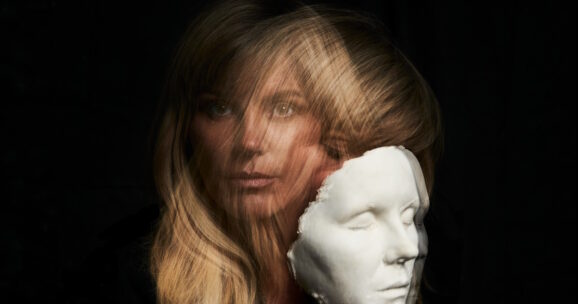[rating=4.00]
 “Ghost on the Canvas” is AM country/rock king Glen Campbell’s swan song before he retires ahead of and advancing case of Alzheimer’s disease. While the album’s lyrical content is full of hints, this is the final public statement of a man looking back on a very colorful life; the music itself is surprisingly strong and upbeat, and Campbell’s voice is as rich and emotional as ever.
“Ghost on the Canvas” is AM country/rock king Glen Campbell’s swan song before he retires ahead of and advancing case of Alzheimer’s disease. While the album’s lyrical content is full of hints, this is the final public statement of a man looking back on a very colorful life; the music itself is surprisingly strong and upbeat, and Campbell’s voice is as rich and emotional as ever.
The album opens with the ringing acoustic tones of “A Better Place,” whose opening lines, “I’ve tried and I have failed, Lord. I’ve won and I have lost,” set the mood for the album. Throughout, Campbell sings of themes such as life, death, eternity, regrets, and facing an uncertain future. Many of the songs are written as Campbell explaining himself and his choices to an unnamed lover, but just as easily serve as Campbell letting his audience know he hasn’t been a saint, but he’s had a hell of a ride and is bravely waiting whatever fate lies ahead.
Fans of Campbell’s earlier work will recognize his acoustic guitar strumming over lush orchestral arrangements right off the bat. The title song opens with spooky beeping noises and the sound of rushing wind before leading into more a familiar drum/acoustic guitar pairing accented with strings as Campbell sings of “a place on the threshold of eternity.”
As a testament to the huge influence Campbell had on popular music in the 1970s, a bevy of Gen X musicians who came of age listening to hits like “Rhinestone Cowboy” while fighting with siblings in the back seat during long car rides make guest appearances. Paul Westerberg of the Replacements helped compose “Ghost on the Canvas,” while Jakob Dylan assisted with writing the traditional country number “Nothing But the Whole Wide World.”
In addition, Billy Corgan lends electric guitar to the Beatlesesque “There’s No Me…Without You” (whose name sounds like a Smashing Pumpkins song). And surf pioneer Dick Dale, a Campbell contemporary, adds flair to the lively “In My Arms,” providing a solo that manages to blend 60s psychedelia with 50s rockabilly.
While official “final albums” are often hastily thrown together to squeeze a few more bucks out of a waning career, it is clear Campbell is making a genuine effort to go out on a high note, and he succeeds. The best of “Ghost on the Canvas” stands up to his most popular work from days gone by and with the exception of a few short instrumentals, the lesser songs do not come across as filler. The way this album sounds, it could have been released in 1976, and that is a compliment.










